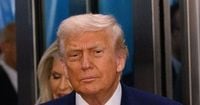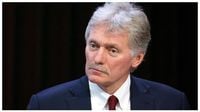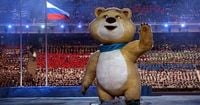In a week of diplomatic fireworks and sharp retorts, the war of words between Washington and Moscow has taken a dramatic new turn. At the heart of the latest spat is U.S. President Donald Trump’s surprising rhetorical pivot on the Russia-Ukraine conflict—a move that has not only stunned political watchers but also provoked a colorful response from the Kremlin.
On September 23, 2025, against the backdrop of the United Nations General Assembly in New York, President Trump stood alongside Ukrainian President Volodymyr Zelenskyy and delivered a statement that marked a striking departure from his previous positions. For months, Trump had been urging Ukraine to consider territorial concessions and floating the idea of swaps with Russia. But on this day, he declared, “We have great respect for the fight that Ukraine is putting up. It’s pretty amazing, actually.” He went further, describing Russia as a “paper tiger” and asserting that Ukraine, with the support of the European Union and NATO, could win back all of its territory and restore its pre-2022 borders. According to Reuters, Trump added, “With time, patience, and the financial support of Europe and, in particular, NATO, the original borders from where this war started is very much an option.”
The change in tone was immediate and unmistakable. Trump, who had previously pressed Ukraine to make deals with Moscow, was now urging Kyiv to act swiftly, claiming that Russia was facing “big” economic problems. He doubled down on his stance in a post on his Truth Social platform, writing, “Russia has been fighting aimlessly for three and a half years a War that should have taken a Real Military Power less than a week to win. This is not distinguishing Russia. In fact, it is very much making them look like ‘a paper tiger.’”
The remarks sent shockwaves through diplomatic circles and did not go unanswered. By the morning of September 24, Kremlin spokesperson Dmitry Peskov was on the airwaves, offering a quintessentially Russian rebuttal. “Russia is by no means a tiger. After all, Russia is more associated with a bear. There are no ‘paper bears,’ and Russia is a real bear,” Peskov declared on RBC Radio, as reported by TASS and Newsweek. “There is nothing paper about it,” he added, underscoring Russia’s self-image as resilient and robust, not to be dismissed by Western taunts.
Peskov was quick to address the economic claims, too. He acknowledged that sanctions had caused some problems but insisted the Russian economy remained stable and that Russia “maintains its resilience, Russia maintains macroeconomic stability.” He also suggested that Trump’s rhetoric was influenced by his meeting with Zelenskyy, stating, “As far as we understand, President Trump’s statements were made after communicating with (Ukrainian President) Zelenskiy and, apparently, under the influence of a vision set out by Zelenskiy. This vision contrasts sharply with our understanding of the current state of affairs.”
While Trump’s words were seen as a morale boost for Ukraine, Russian officials and commentators were quick to cast doubt on their substance. Peskov dismissed the notion that Kyiv could reclaim all its land, arguing, “The fact that Ukraine is being encouraged in every possible way to continue hostilities and the argument that Ukraine can win something back is, in our view, a mistaken argument... The dynamics on the front lines speak for themselves.” He insisted that Russia’s slow but steady advance was part of a deliberate strategy, designed to minimize losses and preserve offensive capability.
Some Russian nationalists interpreted Trump’s shift as evidence that the United States was washing its hands of the war, placing the burden squarely on Europe. Konstantin Malofeyev, an ultra-nationalist tycoon, told Reuters, “Yes, Trump suddenly told the world about his love for Ukraine. But the main point... is that the U.S. is washing its hands of the matter. The European Union will pay for everything. To put it even more simply: Trump has sent Ukraine to fight against Russia alongside Europe while buying weapons from the U.S.”
The Kremlin also took the opportunity to announce that Russian Foreign Minister Sergei Lavrov would meet with U.S. Secretary of State Marco Rubio later that day to provide “real information” about the state of the battlefield. Peskov described recent efforts at rapprochement between Moscow and Washington since Trump’s return to the White House in January as yielding “close to zero” results, characterizing the diplomatic track as “sluggish, very sluggish.”
Meanwhile, fighting on the ground showed no signs of abating. Both sides reported continued drone and missile attacks on September 24, underscoring the grim reality that, for all the rhetoric, the conflict remains deeply entrenched. Western military analysts have attributed the lack of a major Russian breakthrough to Ukraine’s determined defense and the grinding nature of drone warfare, with both armies worn down by more than three and a half years of combat.
Trump’s new position also included calls for European allies to end imports of Russian oil and gas, with the U.S. pledging to follow suit by imposing tougher sanctions on China, Moscow’s key strategic partner. Kremlin officials, however, dismissed these moves as attempts by Trump, “a businessman,” to get the world to buy more expensive American oil and gas.
Reactions from Russian political figures were no less colorful. Former President Dmitry Medvedev, now deputy chairman of Russia’s Security Council, accused Trump of “slipping into an alternate reality” and predicted further reversals. “The main thing is to keep flipping his position 180 degrees on every possible issue. That’s how you successfully run a state through social media,” Medvedev quipped. Margarita Simonyan, a prominent state media executive, likened Trump to a tarot card reader promising Ukraine the impossible: “Trump debuts as the tarot card reader telling the thrice-divorced lady that she is going to meet that billionaire prince after all, as long as she buys the magic crystals.”
For his part, Ukrainian President Zelenskyy welcomed the shift, telling reporters that he saw Trump as a “game changer” and noting that Chinese leader Xi Jinping could also play a role in influencing Russia to help end the war. Despite the diplomatic drama, however, the situation on the ground remains perilous, with no clear end in sight.
The latest rhetorical salvos between Washington and Moscow have provided plenty of headlines, but little in the way of tangible progress. As both sides dig in—one with words, the other with weapons—the world watches, waiting to see whether bold talk will ever translate into peace.



